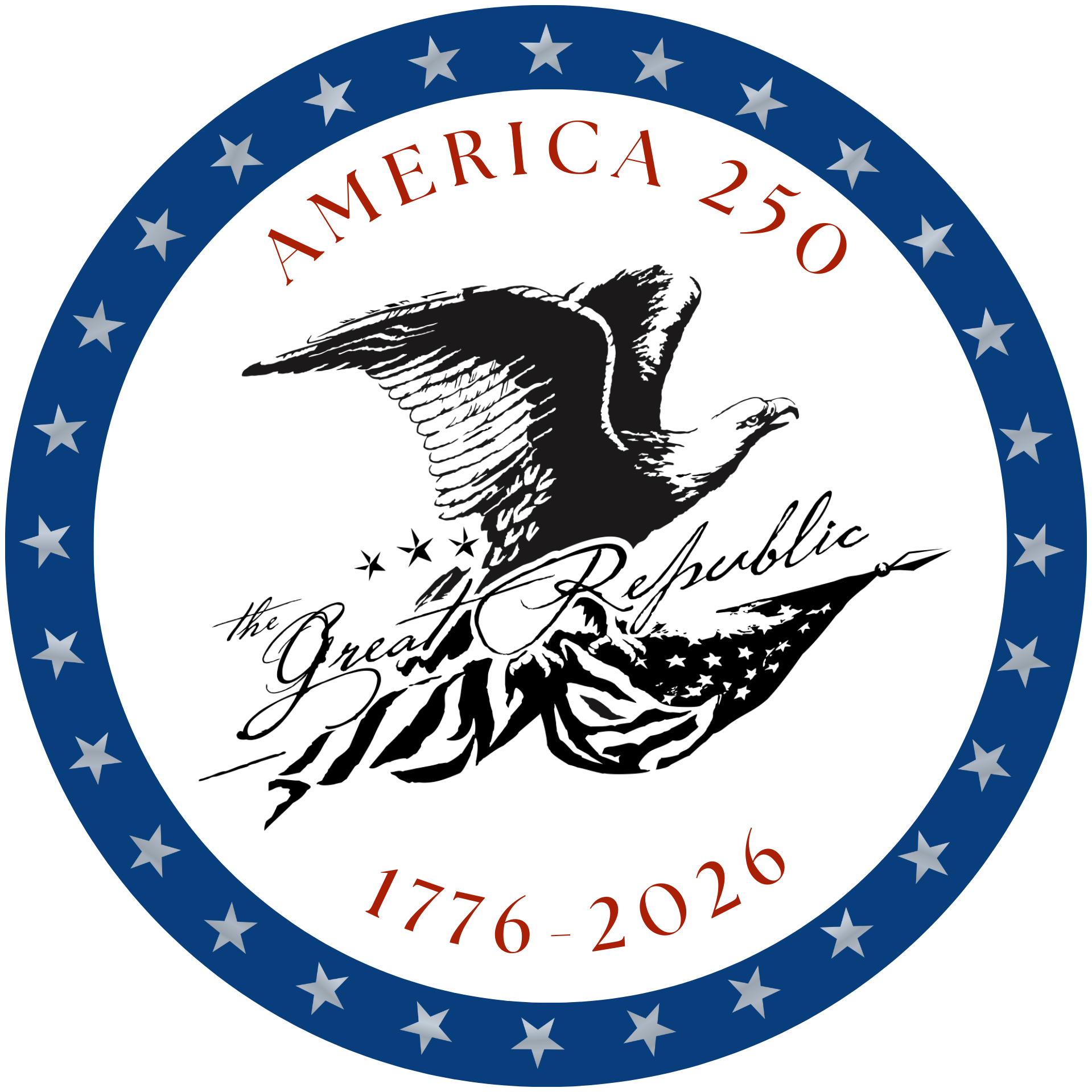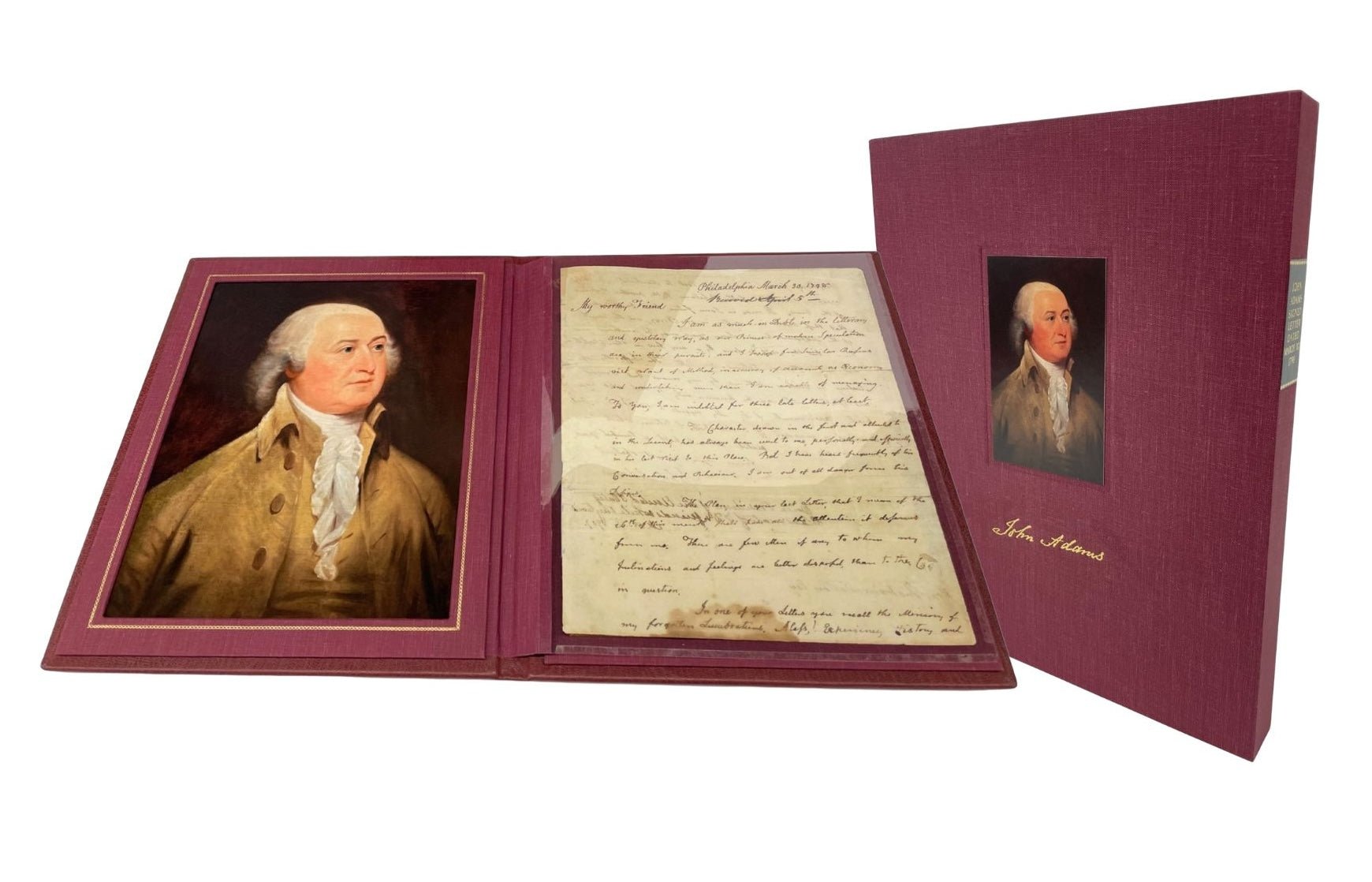
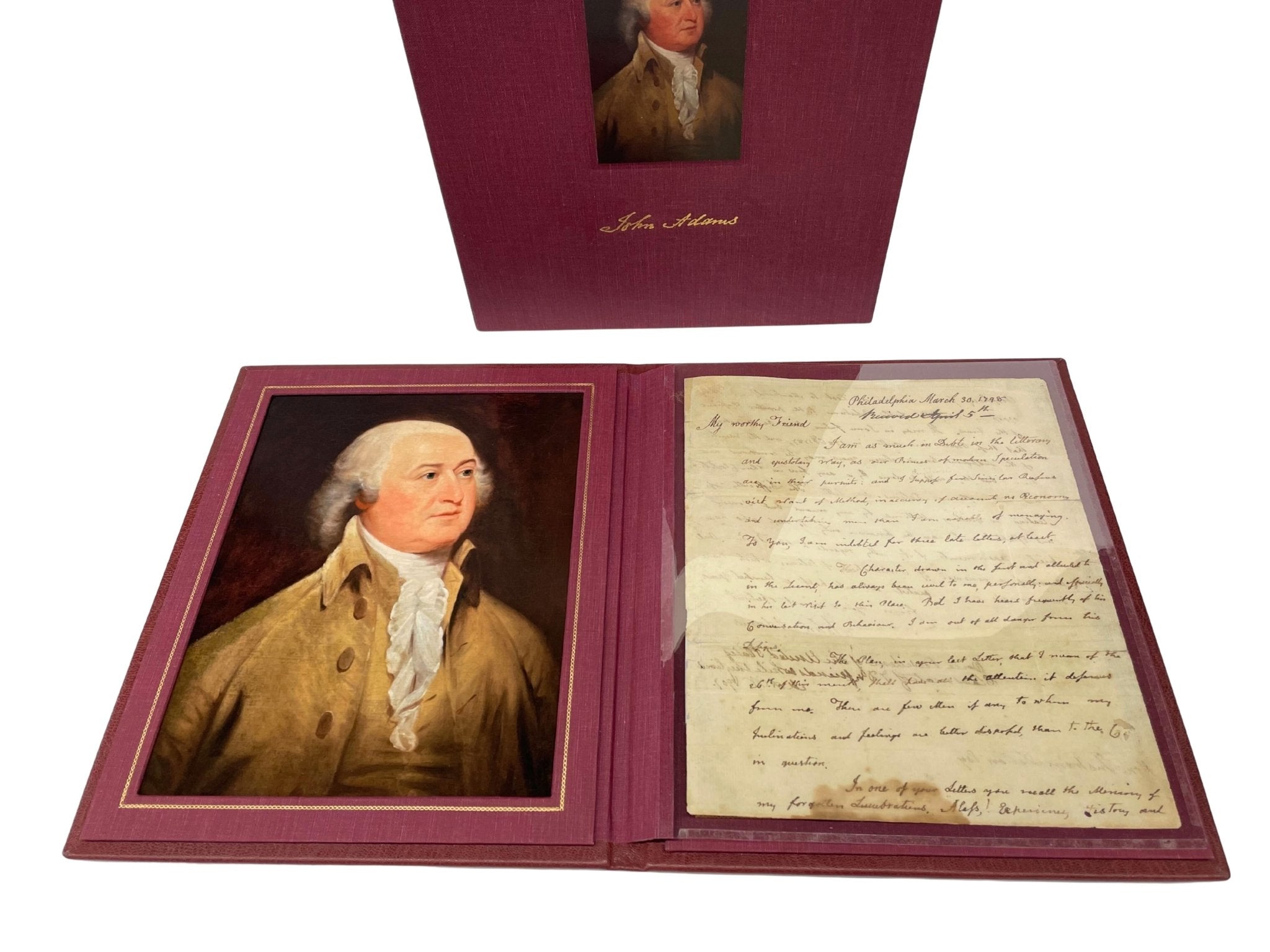
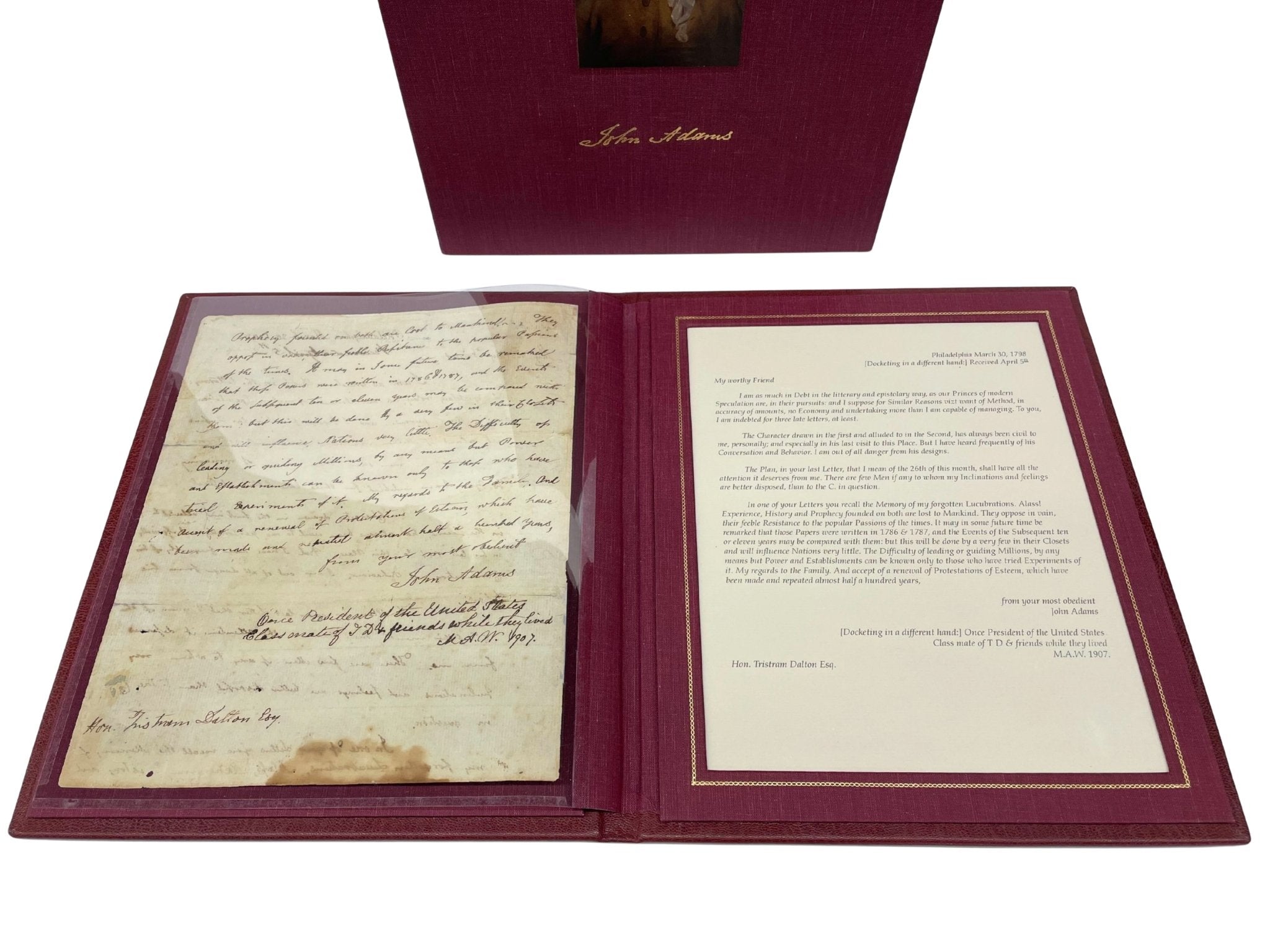
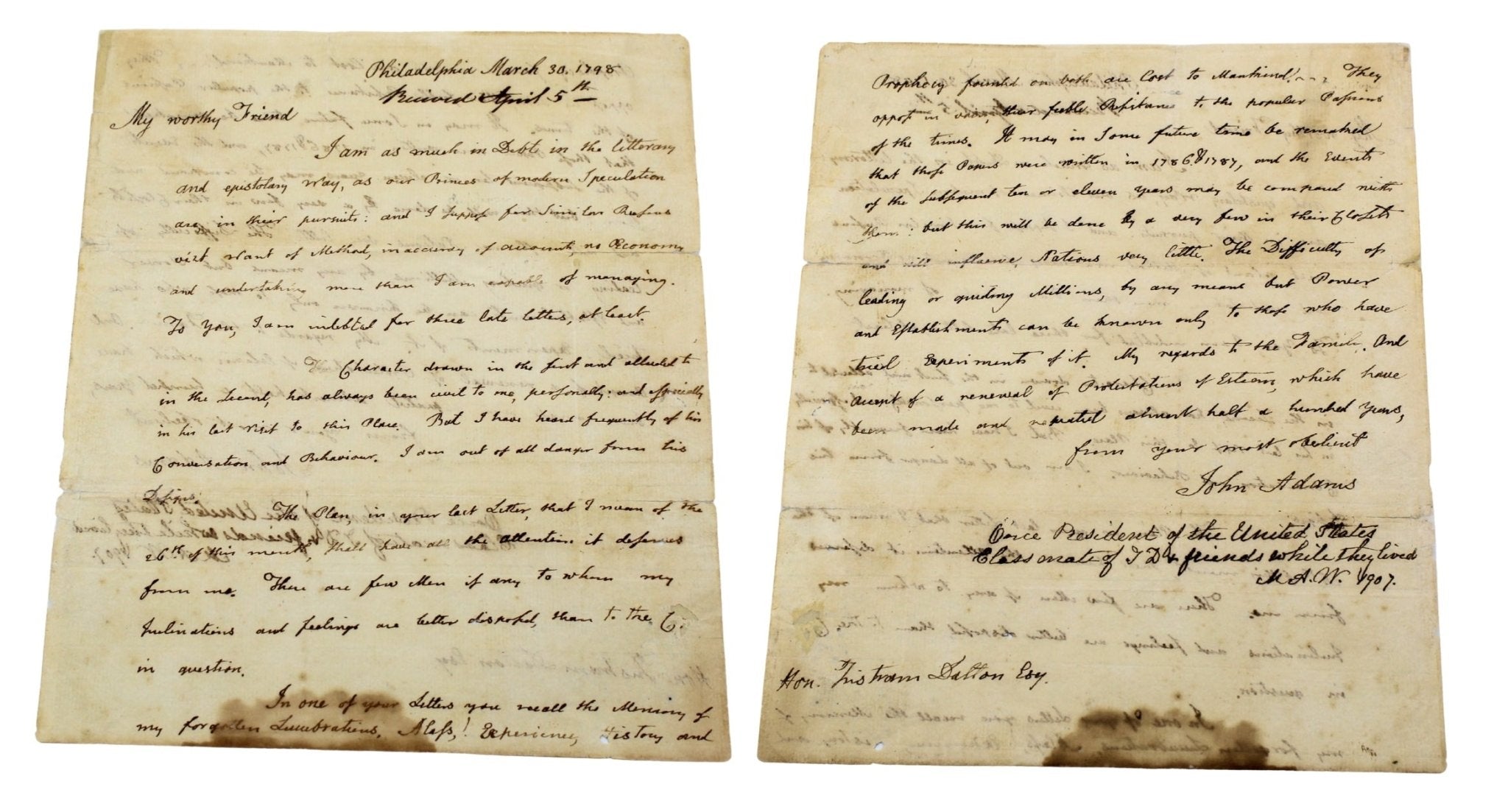
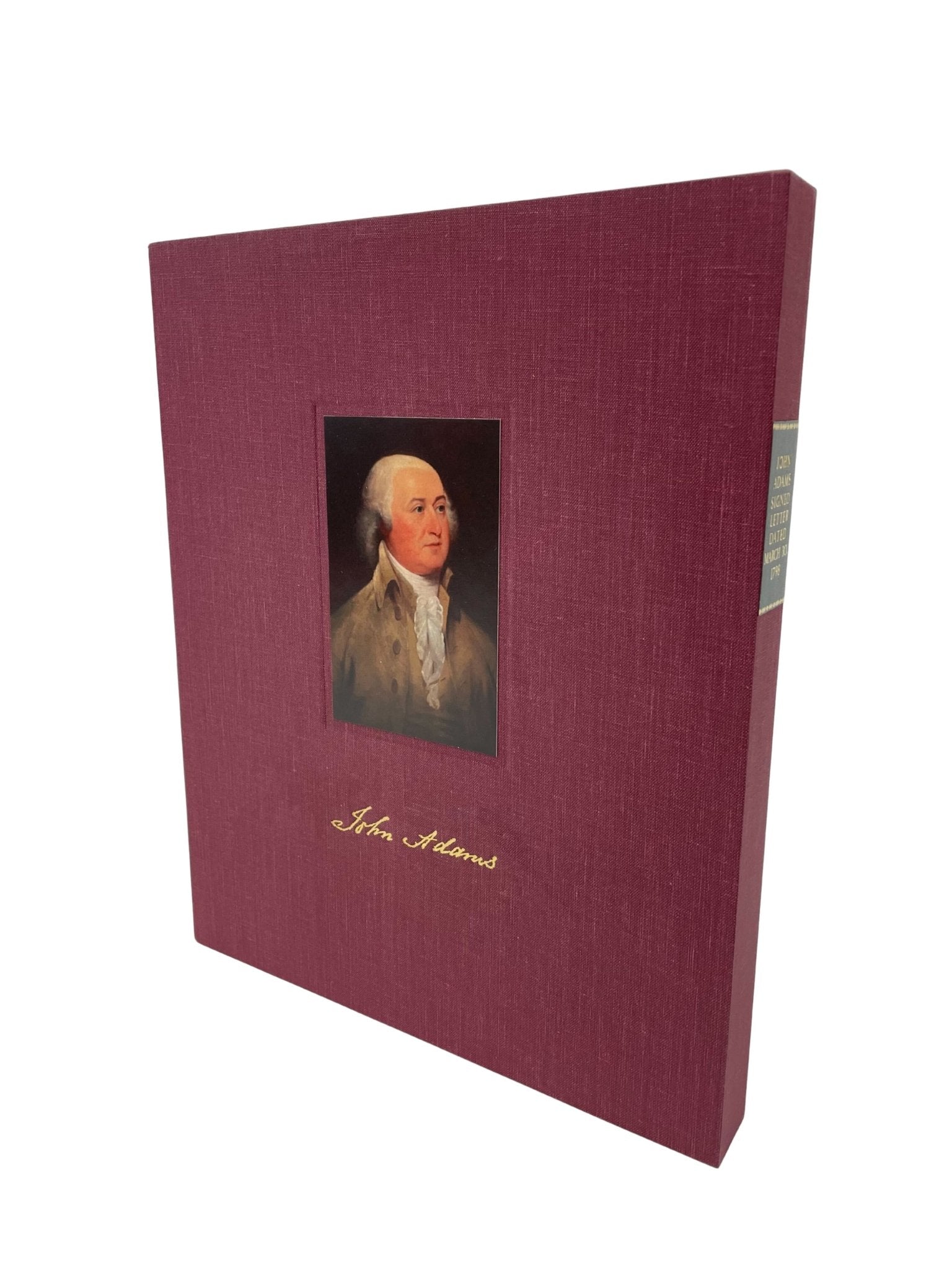
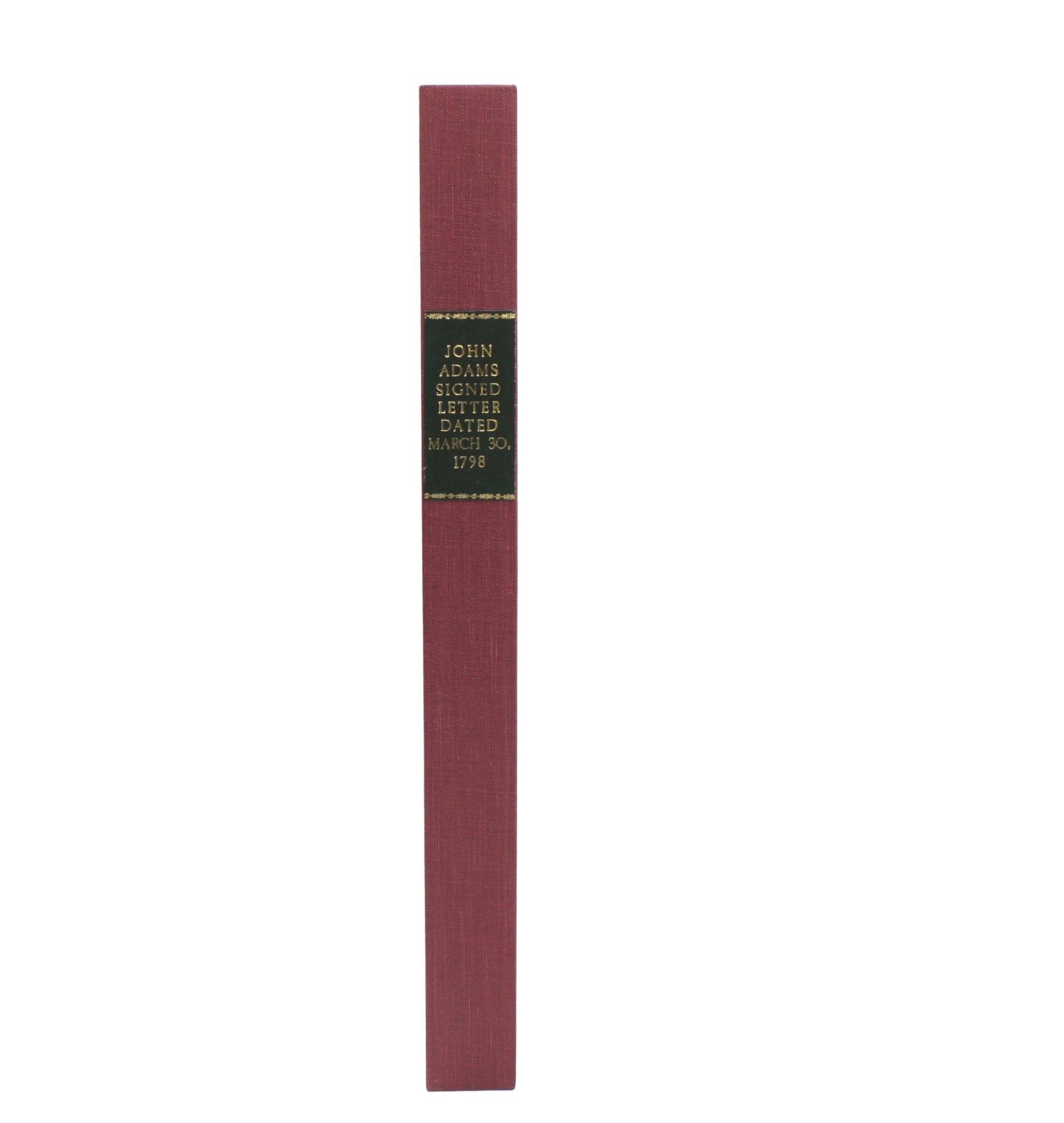
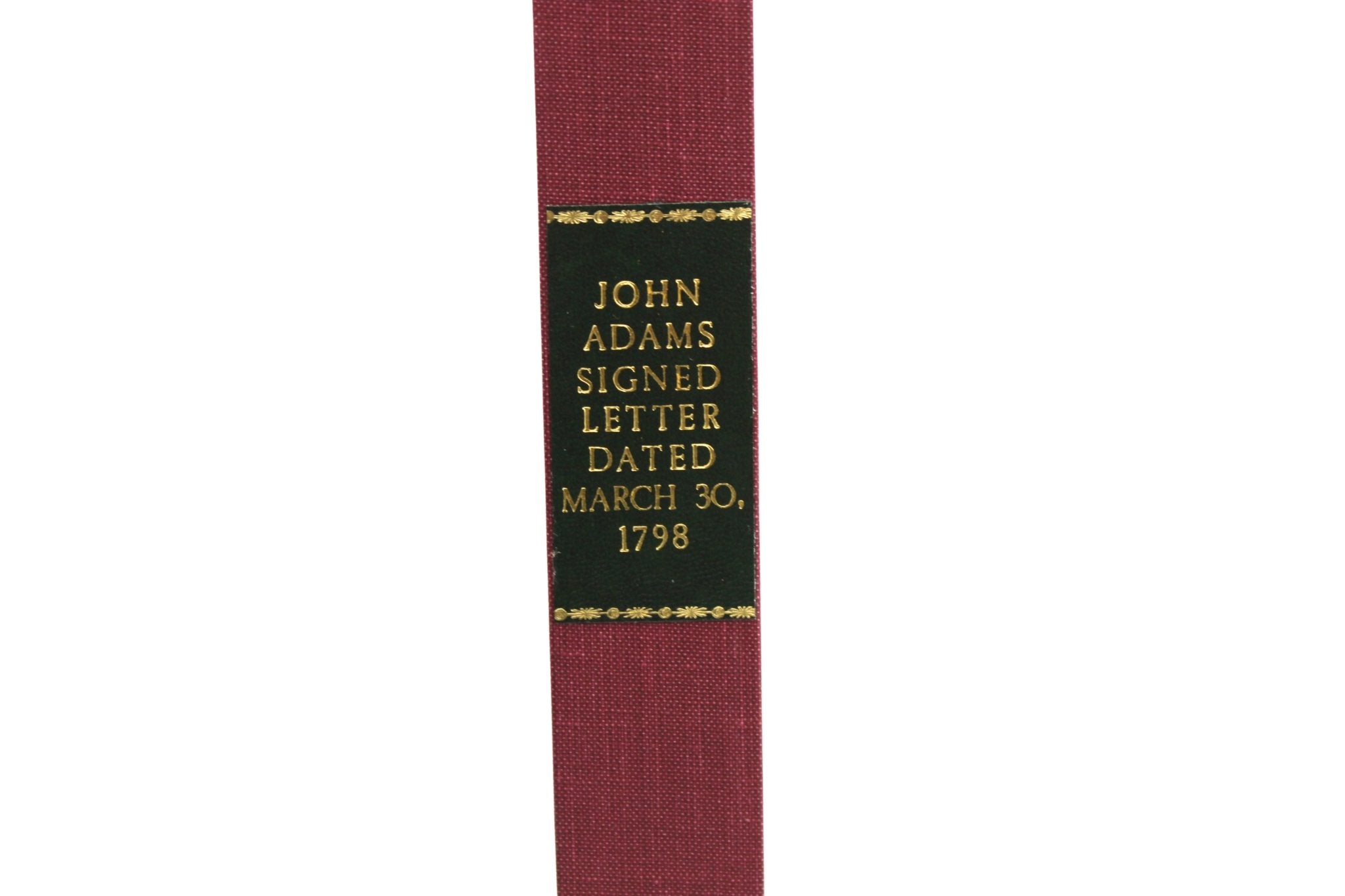
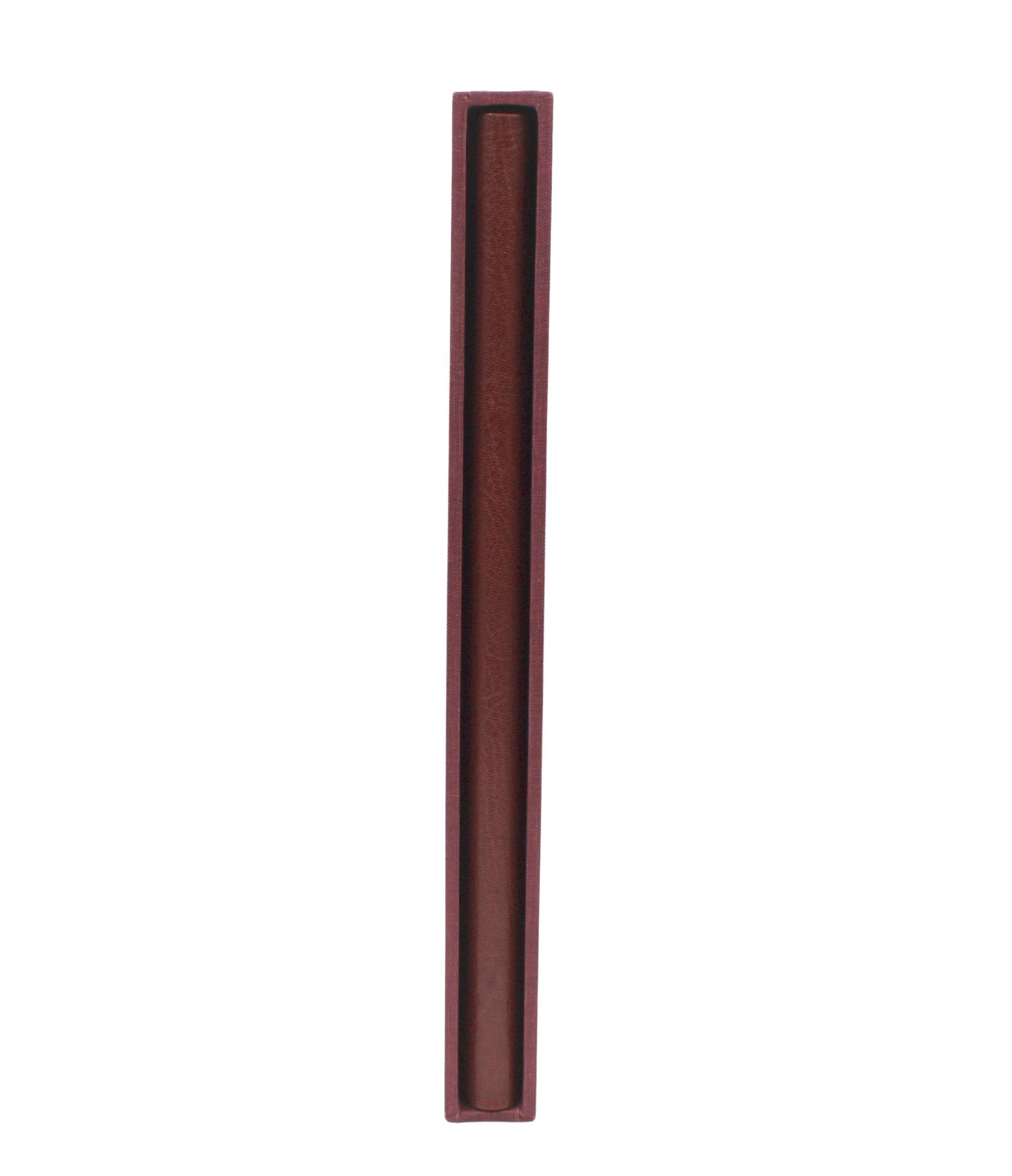
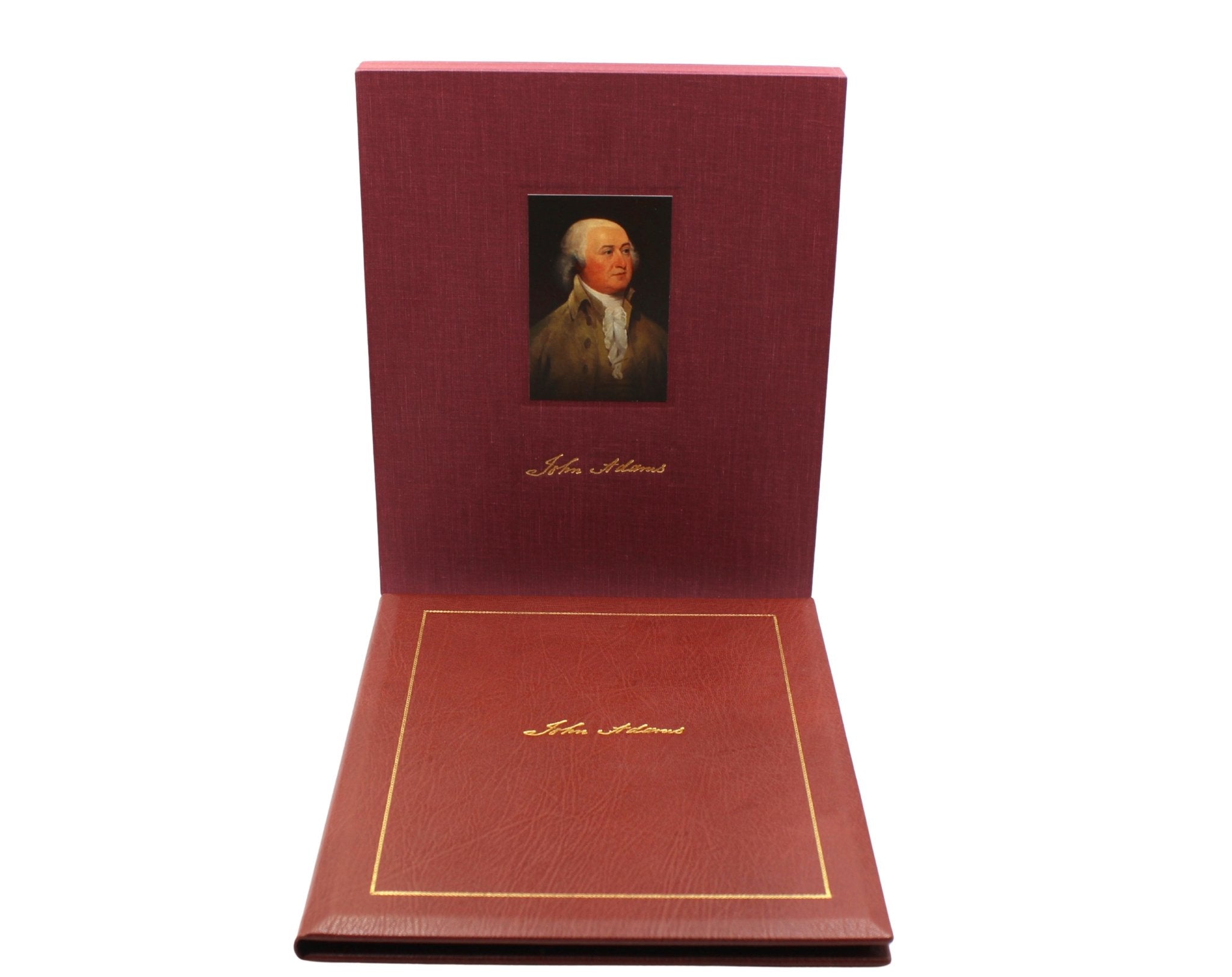
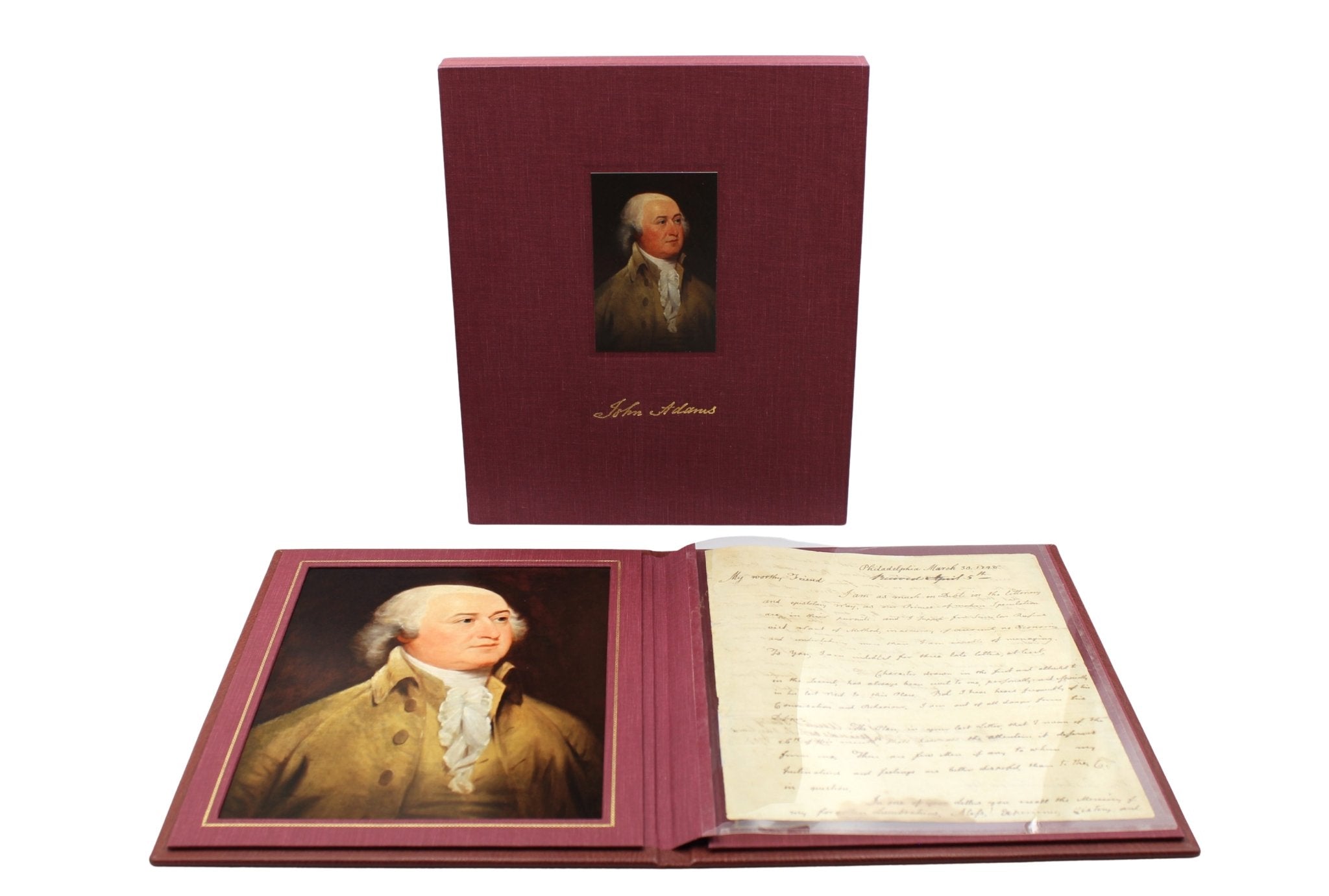
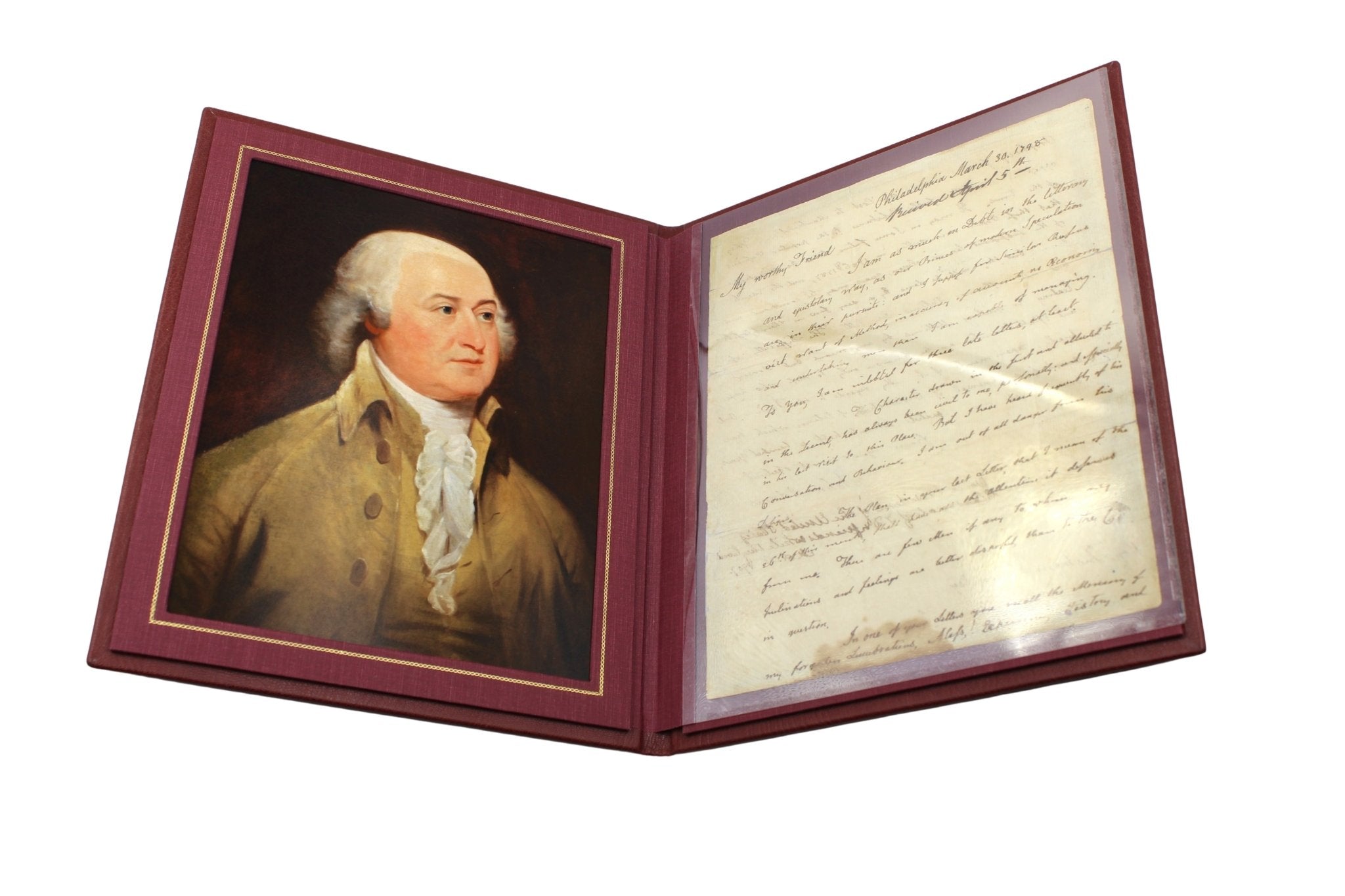
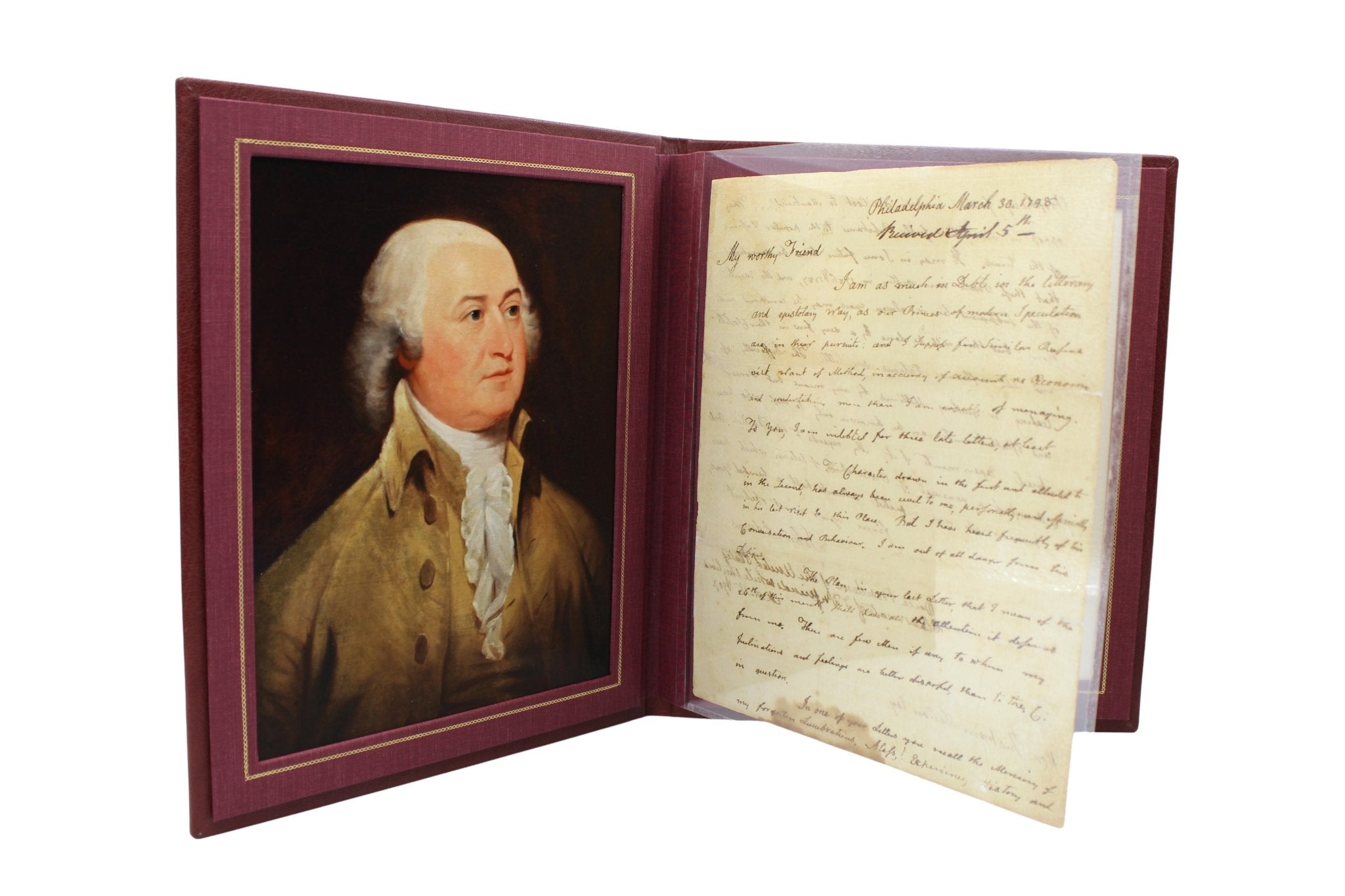
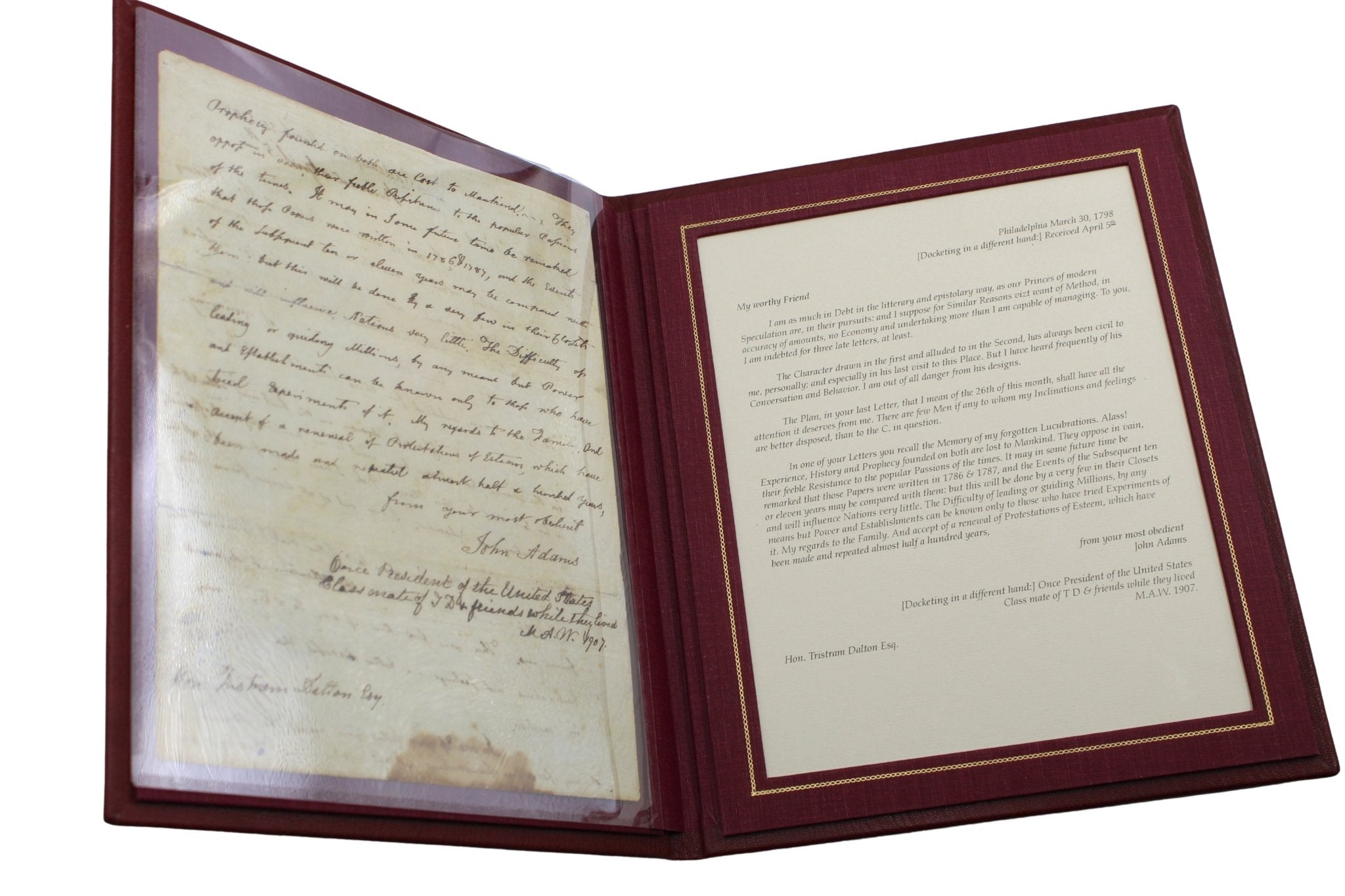
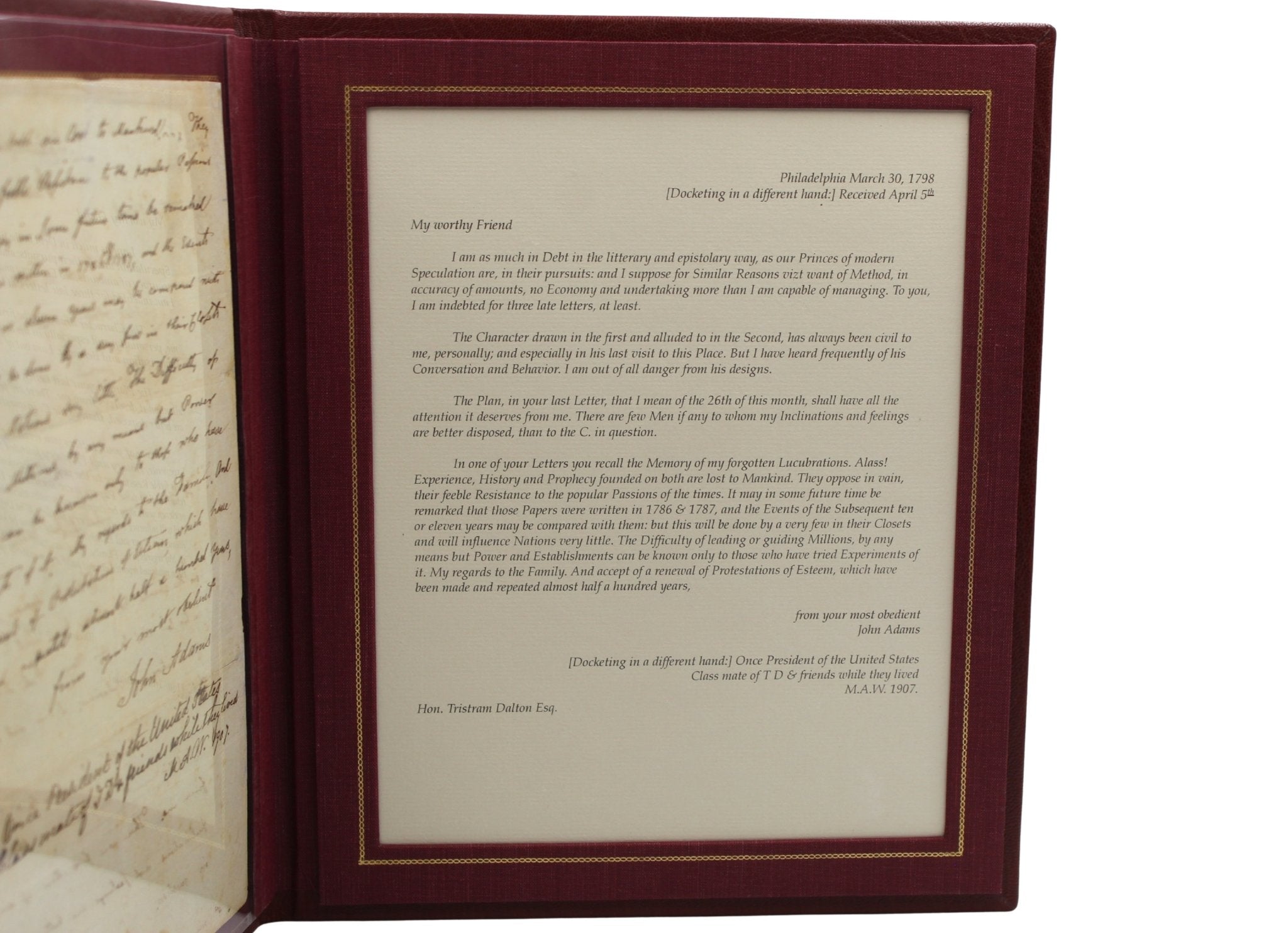
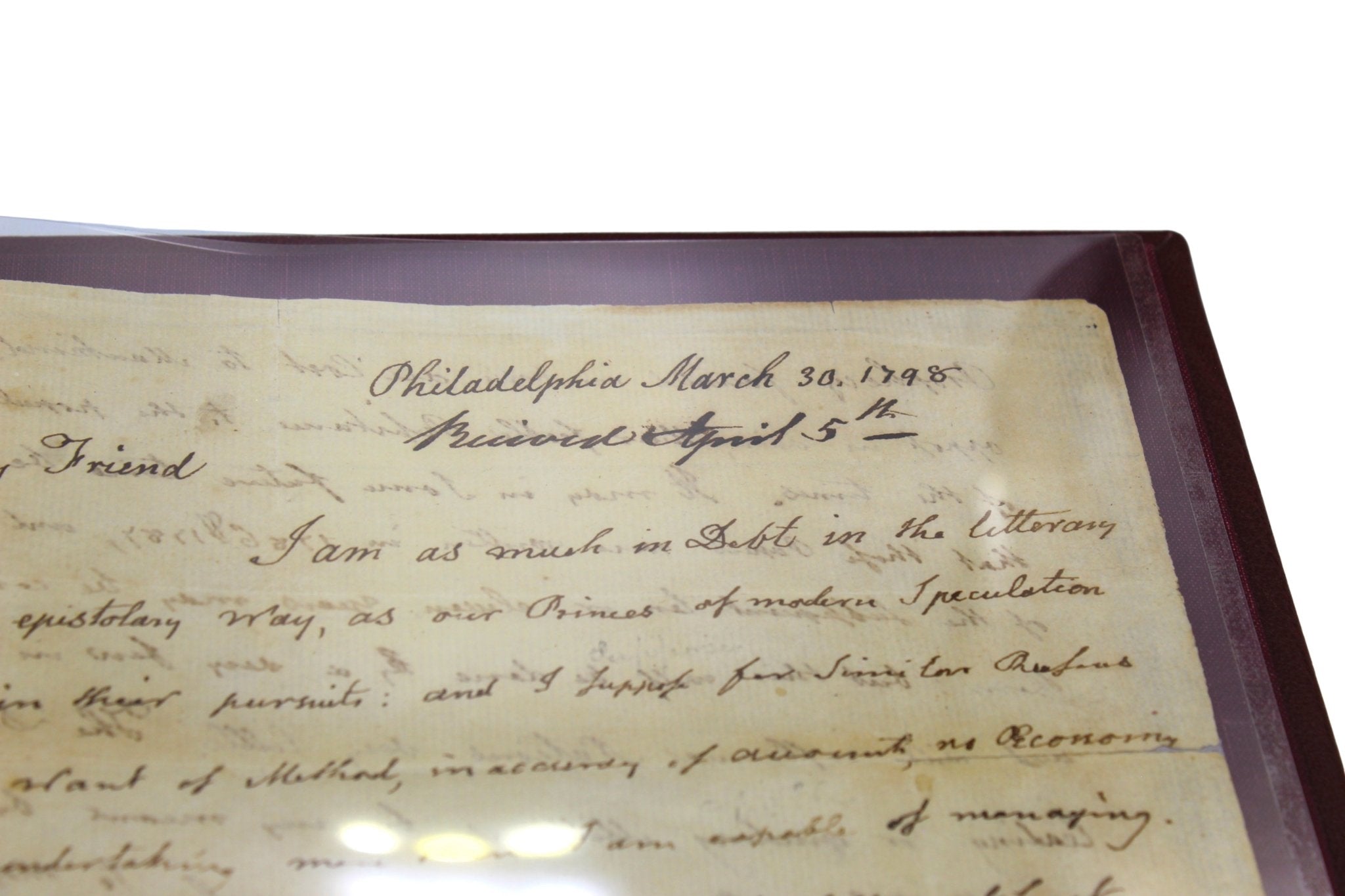
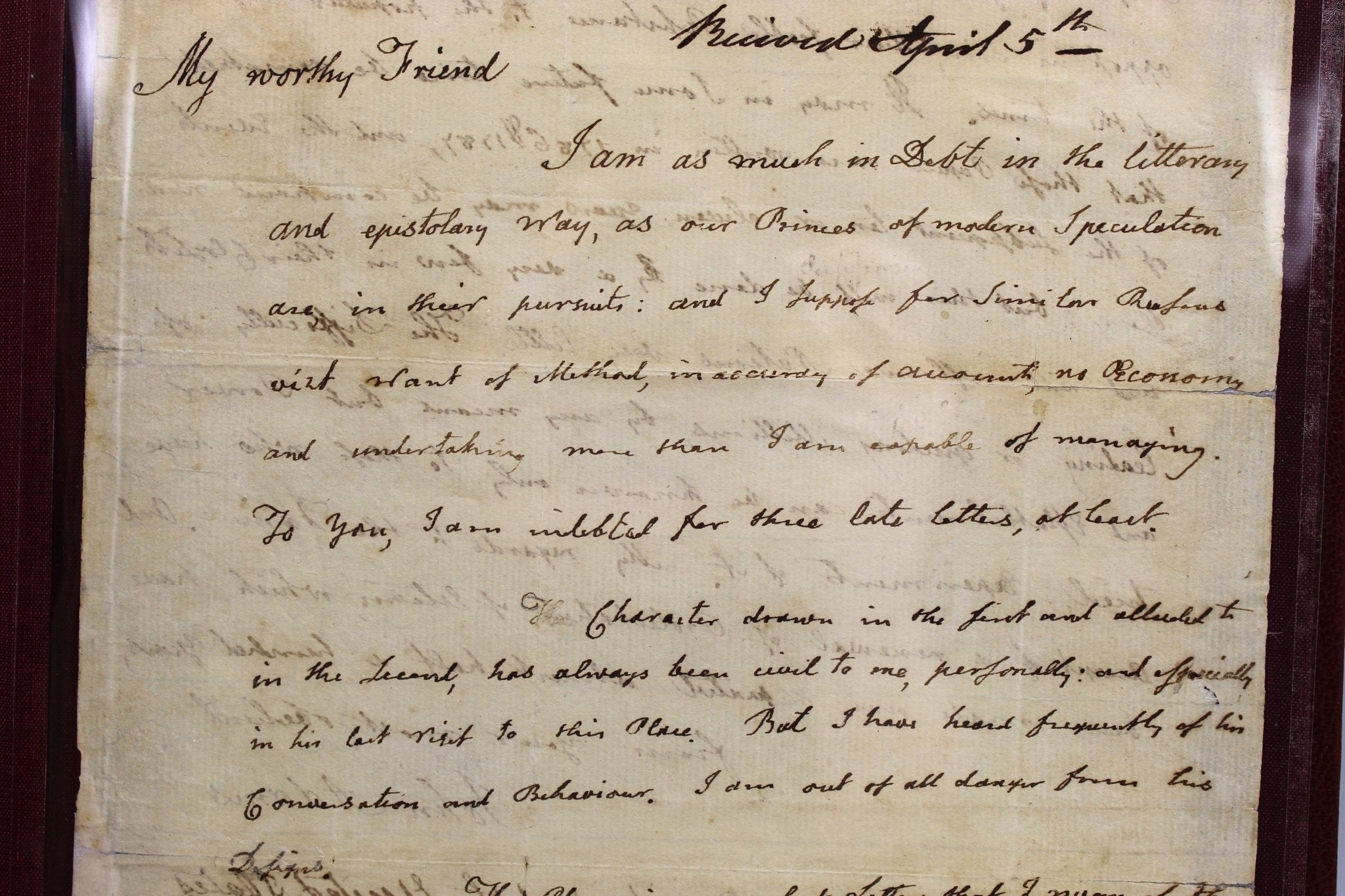
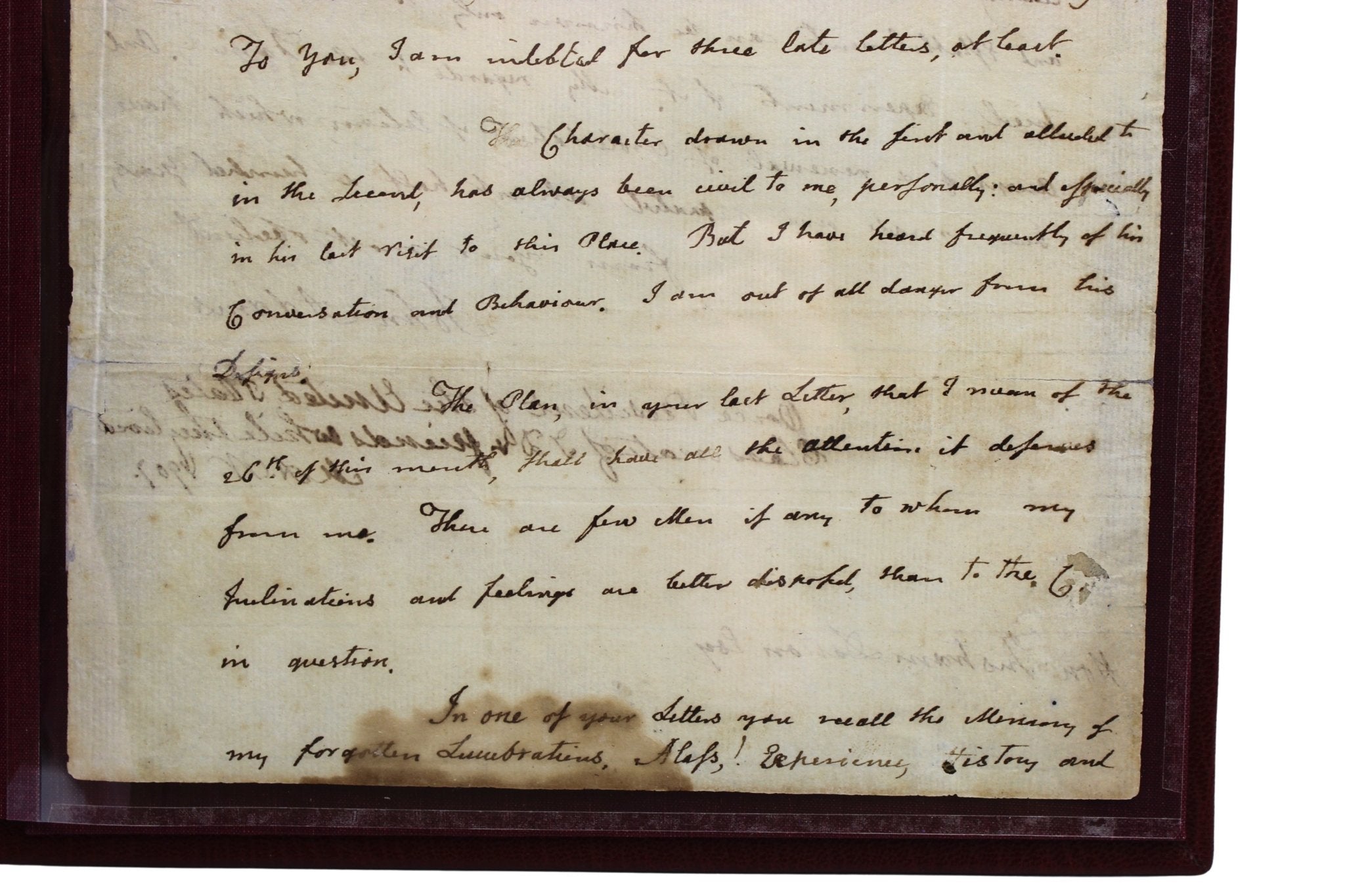
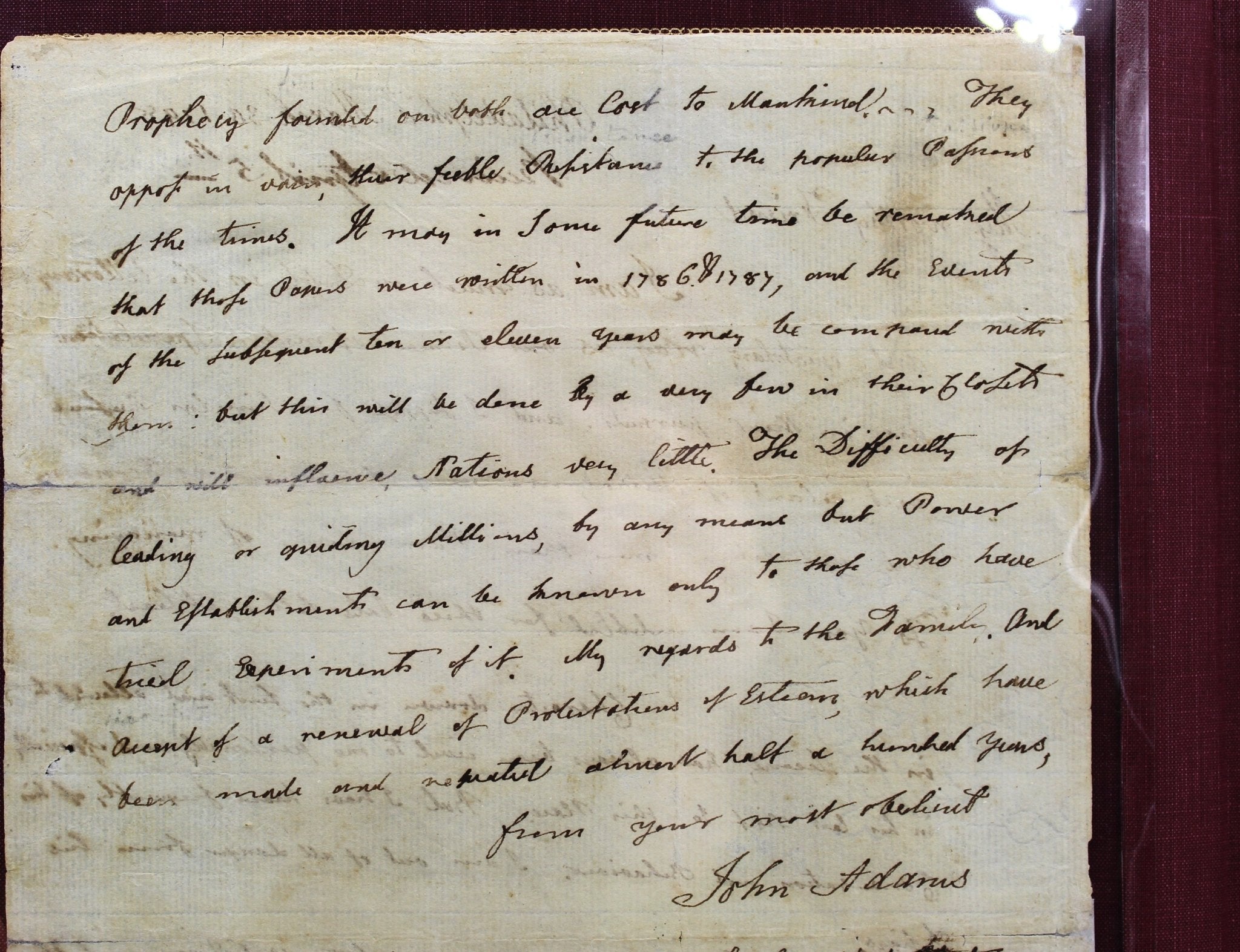
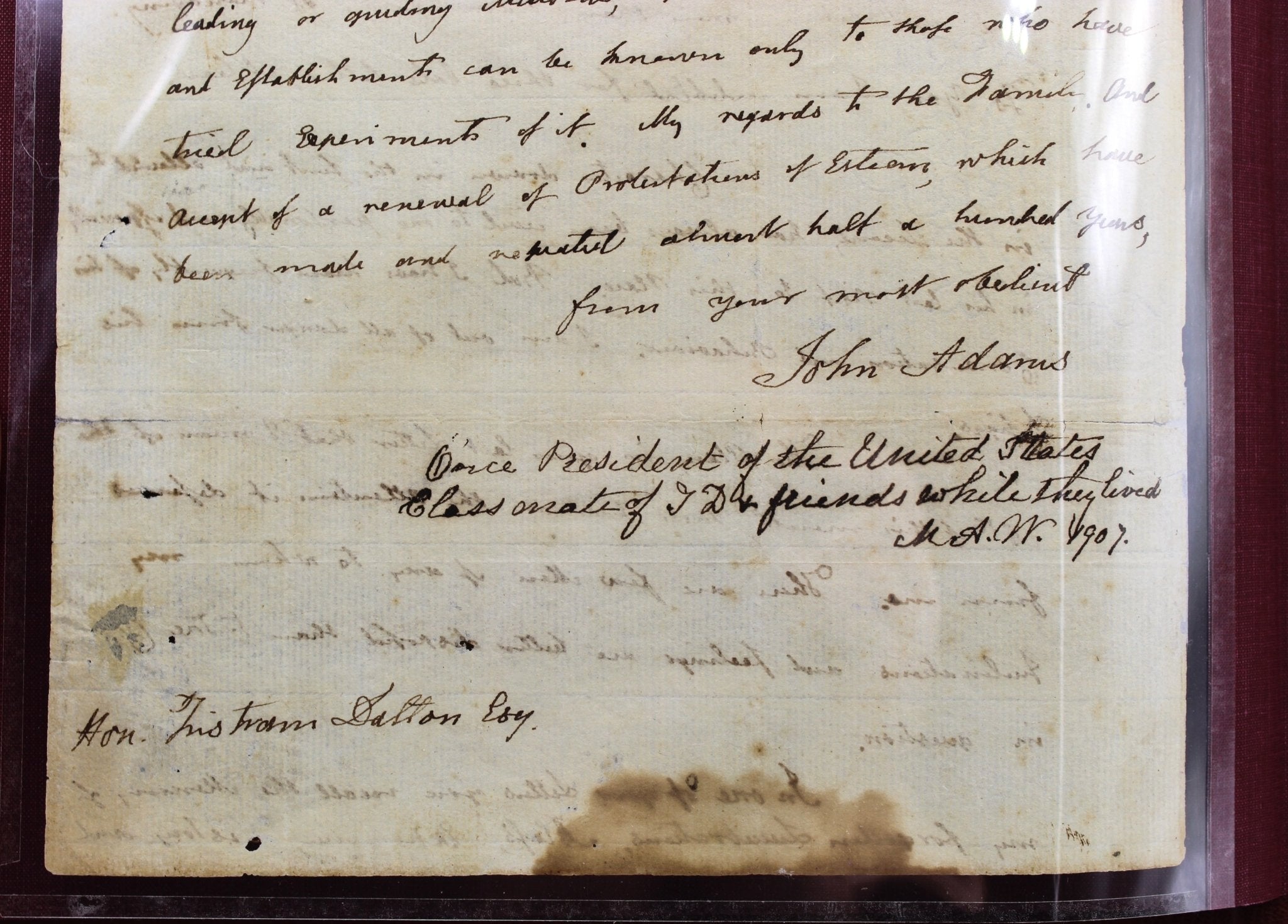
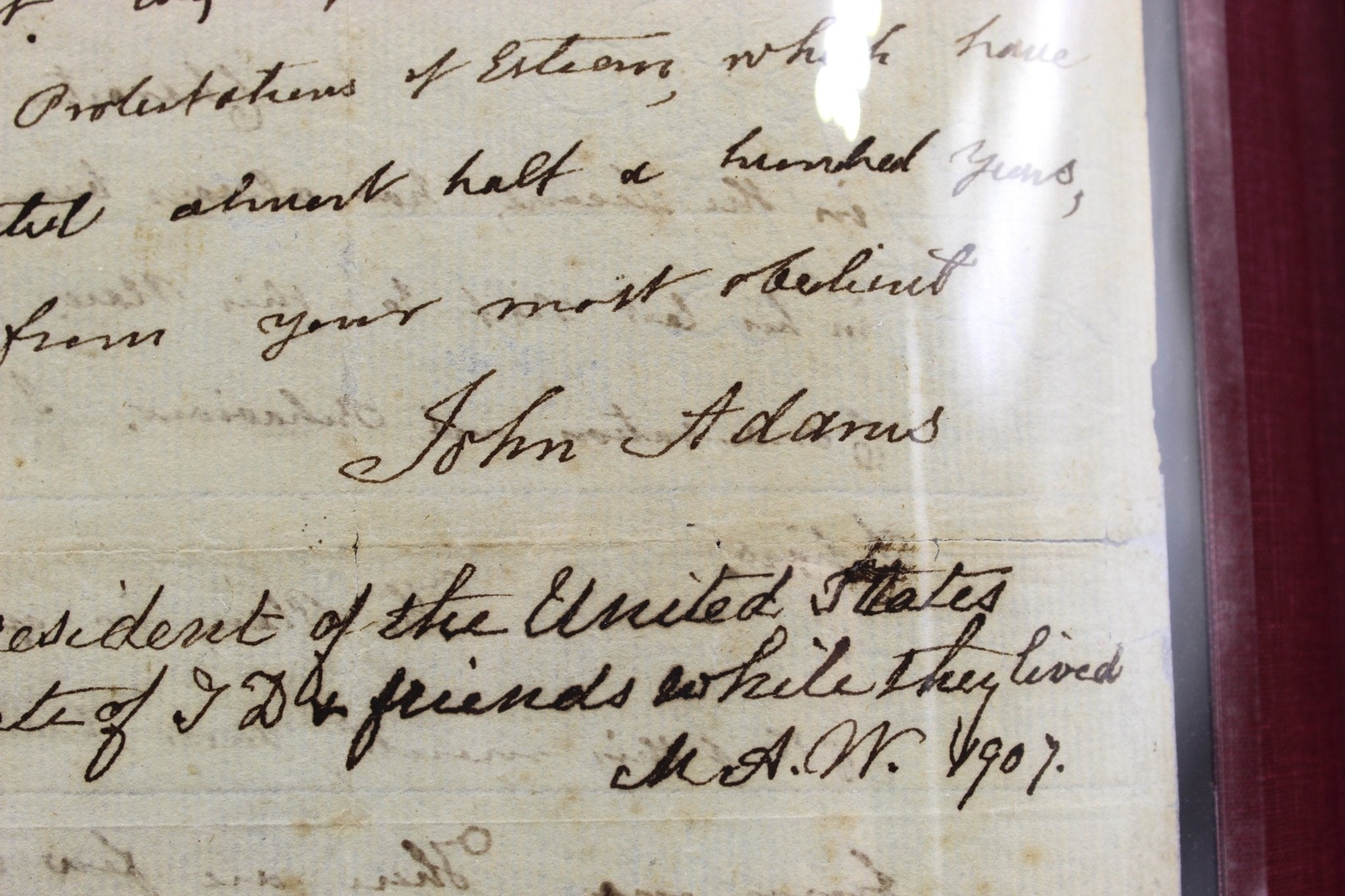
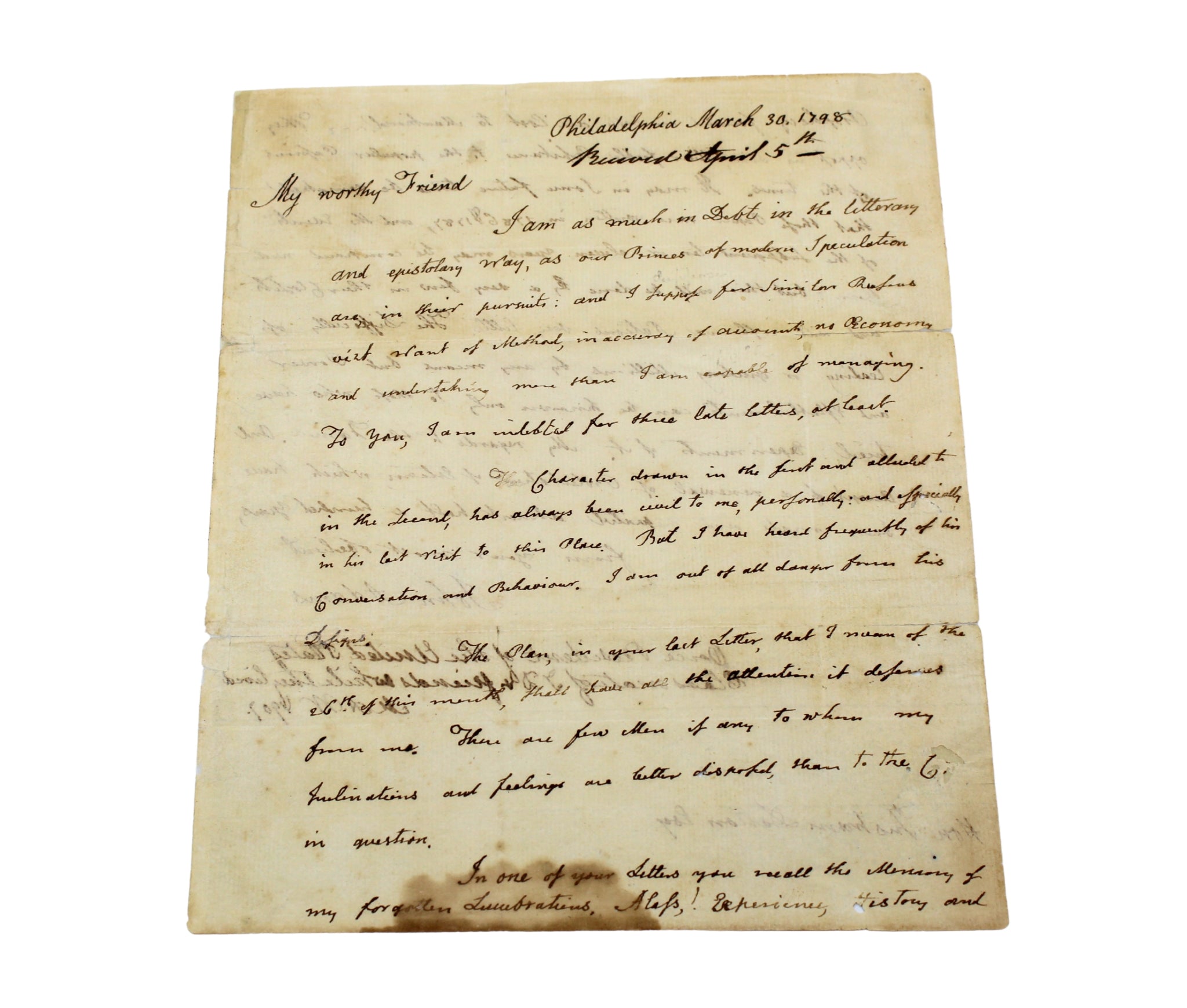
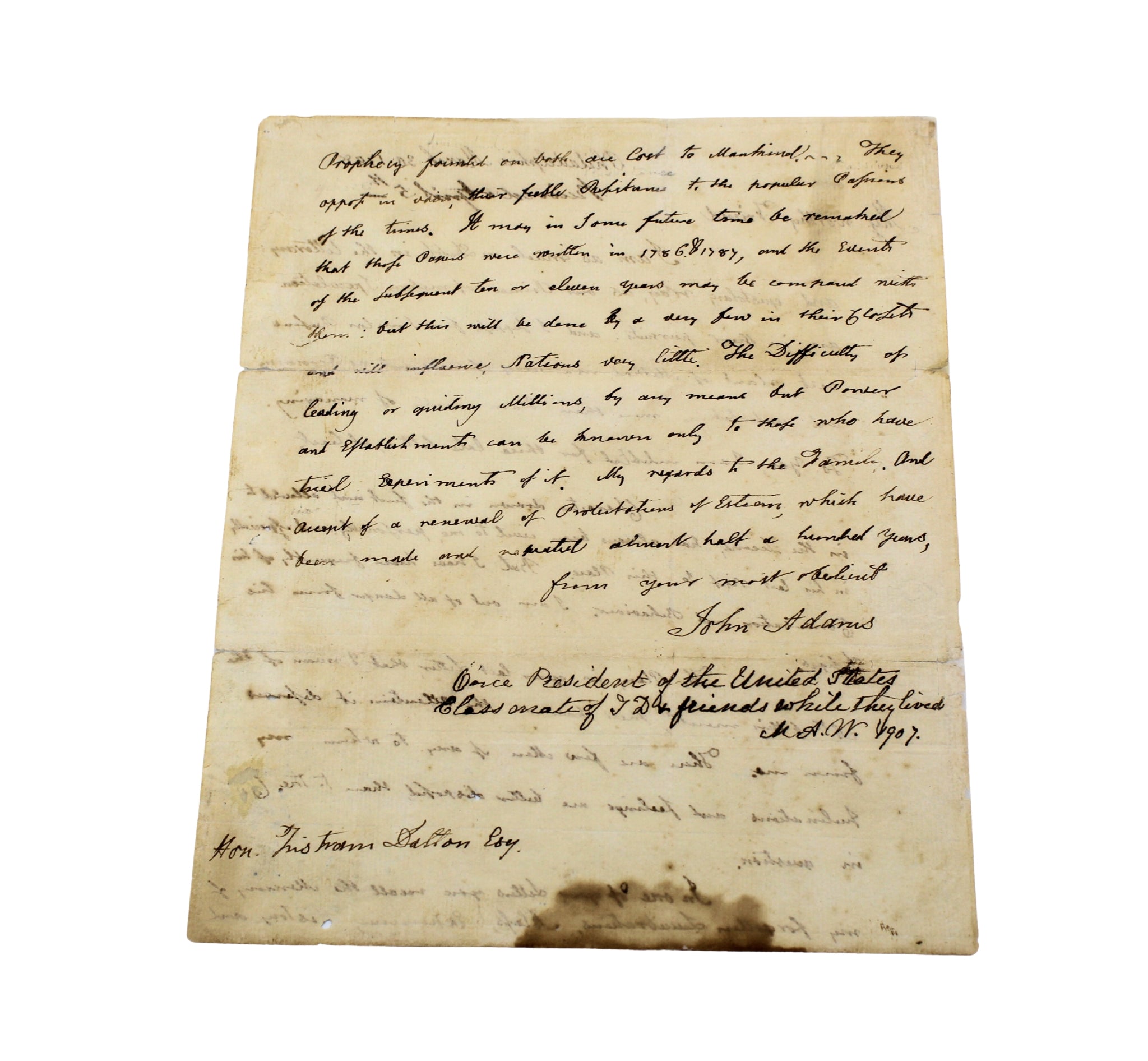
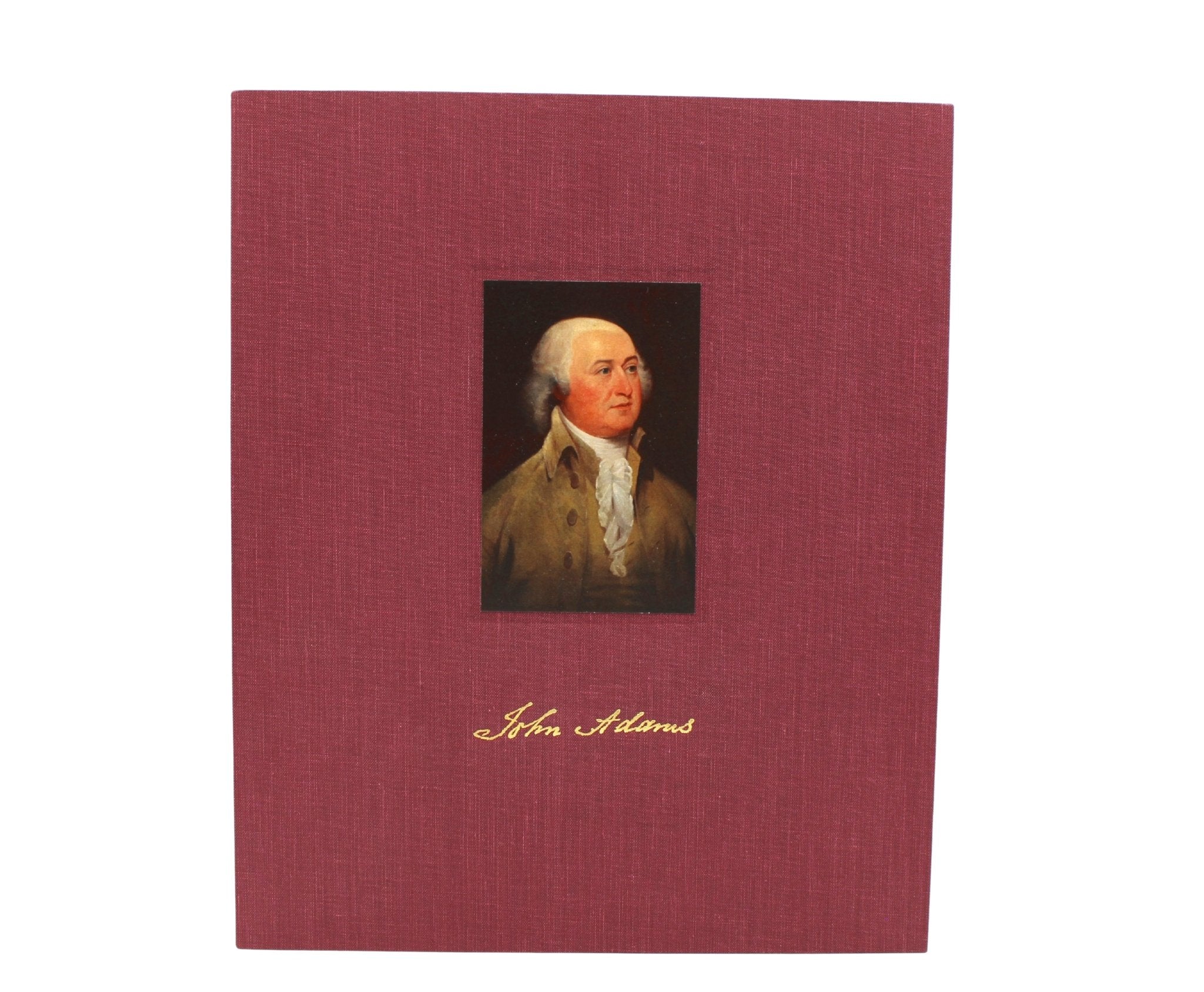
John Adams Letter Signed, to Tristam Dalton, March 30, 1798
Presented is an original two-page autograph letter, written and signed by President John Adams to his old Harvard classmate Tristram Dalton on March 30, 1798. The letter offers a vivid snapshot of the political anxieties surrounding the XYZ Affair and the turbulent months that preceded America’s undeclared naval conflict with France, written candidly and openly.
Adams opens on a personal note, confessing that he is “as much in Debts in the literary and epistolary way, as our Princes of modern Speculation are in their pursuits,” attributing his delayed replies to “want of Method” and to undertaking “more than I am capable of managing.” He acknowledges receiving “three late letters” from Dalton, whose correspondence had grown more urgent as rumors and partisan fervor intensified.
Adams next addresses Dalton’s warning in two of his previous letters, written February 12 and March 20, 1798, about a seemingly affable but politically dangerous acquaintance (1, 2). Though not named outright, the figure is Thomas Law, the British-born speculator whose public denunciations of the Washington administration and vocal justifications of French conduct deeply troubled Dalton. Adams notes that Law “has always been civil to me, personally,” yet he has “heard frequently of his Conversation and Behavior,” reassuring Dalton that he considers himself “out of all danger from his designs.” The remark reveals Adams’s awareness of Law’s behind-the-scenes influence, especially as news of France’s demands for bribes in the XYZ Affair had just erupted into national outrage.
Turning to Dalton’s third letter, written on the 26th of March, Adams acknowledges a land matter involving the “C.[itizen] in question,” a reference to Dalton’s business partner Tobias Lear, George Washington’s former private secretary (3). Lear and Dalton, under the firm name of Lear & Co., had jointly leased property at Harpers Ferry before the United States selected the site for a national arsenal. Their hope was to continue their improvements “without interfering in the Designs of the United States,” but they “were willing to sacrifice to the Public Weal, sensible that every necessary Arrangement for their Works might be made without our being deprived, totally, of the Advantages that [they] had secured.” In this letter, Adams assures Dalton that the plan “shall have all the attention it deserves from me,” adding that “there are few Men if any to whom my Inclinations and feelings are better disposed, than to the C. in question.” This moment captures Adams balancing longstanding friendships with the practical demands of national defense, as in response to France’s aggression, he had just urged Congress on March 19th “to adopt with promptitude, decision, and unanimity such measures as the ample resources of the country afford for the protection of our seafaring and commercial citizens, for the defense of any exposed portions of our territory, for replenishing our arsenals, establishing foundries and military manufactures, and to provide such efficient revenue as will be necessary to defray extraordinary expenses and supply the deficiencies which may be occasioned by depredations on our commerce” (4).
Dalton had also called Adams’s attention back to his earlier political writings, prompting one of the most reflective passages in the letter. Adams observes that Dalton recalls “forgotten Lucubrations,” referencing his Defence of the Constitutions of Government of the United States of America (1787-88). He laments that “Experience, History and Prophecy founded on both are lost to Mankind. They oppose in vain, their feeble Resistance to the popular Passions of the times,” and doubts whether more than “a very few in their Closets” will ever compare the events of the last decade with what he had written in 1787 and 1788. Adams concludes with a sobering rumination on the difficulty of leading a divided nation on the brink of conflict: “The Difficulty of leading or guiding Millions, by any means but Power and Establishments can be known only to those who have tried Experiments of it.”
He closes by extending his “regards to the Family” and offering a “renewal of Protestations of Esteem, which have been made and repeated almost half a hundred years,” a touching reminder of the long friendship grounding the letters between Dalton and Adams.
Written just two weeks after Adams revealed to Congress the humiliating and extortionary demands of French foreign minister Charles Talleyrand’s agents (X, Y, and Z), this letter reflects the president’s unease with the surging partisan passions that the crisis had unleashed. Rich in content, this multifaceted letter links the XYZ Affair, Washington-era political intrigue, early federal land development, and Adams’s own philosophical reflections. It is an exceptional artifact from the second president’s administration.
CONDITION:
JOHN ADAMS. Autograph Letter Signed, as President, to Tristram Dalton, March 30, 1798, Philadelphia, Pennsylvania. 2 pp., 8 x 9⅞ in. In very good condition, with expected folds, minor edge splitting at fold lines. Light consistent toning. Larger stain at the bottom center. Ink remains strong and legible throughout, with Adams’s bold signature particularly clear. Docketing on verso in a different hand.
This letter is archivally presented in a new, custom full leather bound burgundy folio, with gilt tooled cloth interior, a portrait of Adams, the letter encased in mylar so both sides are visible, and a printed transcript of the letter. This folio is encased in a matching cloth slipcase with inlay portrait of Adams and gilt embossed signature on front.
Dimensions: Slipcase: 11 7/8"H x 9 3/4"W x 1 1/8"D. Folio: 11 3/8"H x 9 1/2"W x 3/4"D.
REF:
-
“To John Adams from Tristram Dalton, 12 February 1798,” Founders Online, National Archives
-
“To John Adams from Tristram Dalton, 20 March 1798,” Founders Online, National Archives
-
“To John Adams from Tristram Dalton, 26 March 1798,” Founders Online, National Archives
-
Adams, John. 1798. “Message to the Senate and House, March 19, 1798: Regarding Reports of the Envoys to France.” The Avalon Project. Yale Law School.
Accompanied by our company's letter of authenticity. Excluded from company promotions or sales.
Pickup available at Colorado
Usually ready in 4 hours

John Adams Letter Signed, to Tristam Dalton, March 30, 1798
Colorado
1 Lake Avenue
Colorado Springs CO 80906
United States
Choose options























Frequently Asked Questions
FAQs
Yes, all of our Antiques are certified authentic. Every antique comes with a signed Letter of Authenticity that details the item’s history, its current condition including any conservation, binding, or framing work, and the item’s provenance. The Letters of Authenticity are priced valuations by our authentication specialists, who assure that items are original and unconditionally guaranteed as genuine for life.
We pack and ship your items from our gallery in Colorado Springs. You may also choose to come pick up your order. Antique items are carefully packed and insured during shipping. The shipping price will be calculated at checkout.
We acquire from a variety of trusted sources all over the world, but mostly through auctions and private collections within the United States. All provenance information will be listed on the Letter of
Authenticity accompanying your purchase.
